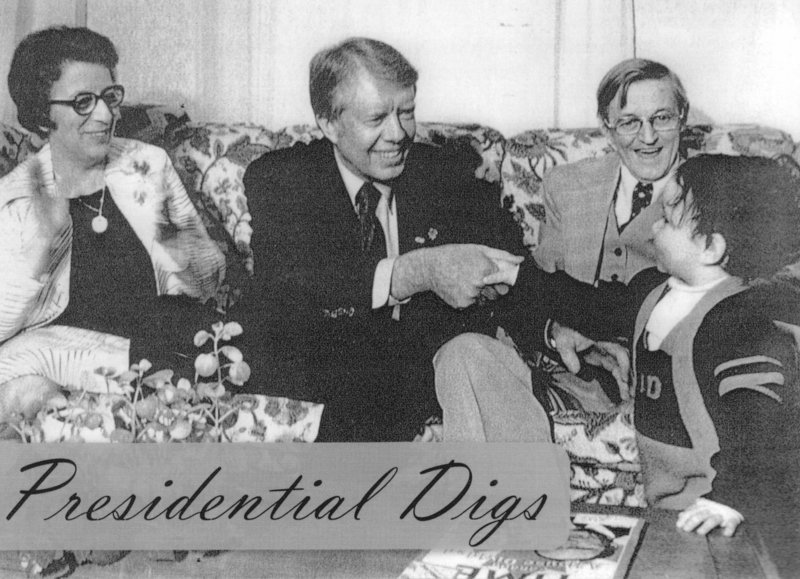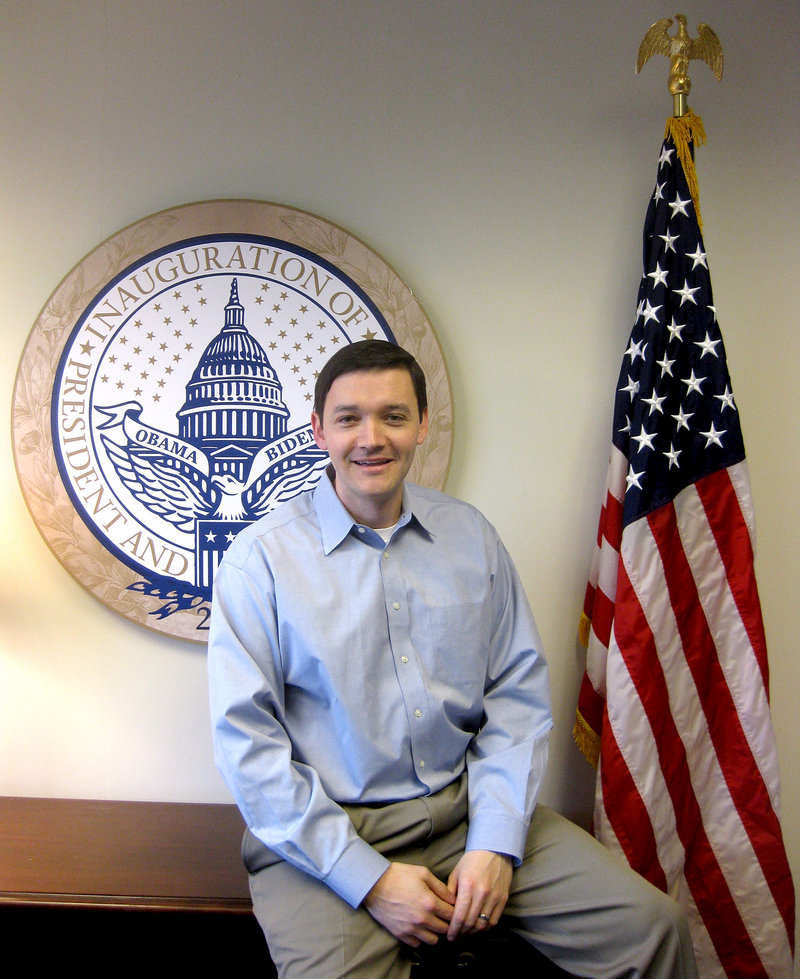WASHINGTON – When Democratic U.S. Rep. Mike Michaud wants to make sure the Obama administration takes into account Maine’s perspective on issues like fishery management, he calls fellow Mainer Emmett S. Beliveau.
Why does Michaud, a powerful guy in his own right, seek out the 34-year-old Beliveau when he’s trying to press a point with the White House and President Obama?
Because Beliveau, who was virtually weaned on power politics, holds down a key place in the White House power structure — chief of staff to Chief of Staff William Daley.
Having Beliveau in a top job at the White House doesn’t guarantee that Maine holds sway, but it certainly didn’t hurt when the state was trying to make sure that its fishery regulation needs were taken into account along with Massachusetts’, Michaud said.
On any given issue, the White House is lobbied and pushed and pulled from all sides, and it’s not always easy to reach key White House officials, even for a member of Congress.
“The fact that (Beliveau) hasn’t forgotten where he came from is extremely important,” said Michaud, who had Beliveau as an early, unpaid congressional campaign volunteer. “My chief of staff or myself can pick up the phone any time. We have his cellphone number if we can’t get through to someone at the White House. … It is that relationship that is extremely important.”
What is a chief of staff to the chief of staff?
It’s a behind-the-scenes kind of job, essentially a gatekeeper to the ultimate gatekeeper. It’s a job that apparently evolved out of a centralization of authority in the White House that began in the Bush administration and was adopted in large part by Obama, says one veteran of the Clinton administration.
“There has been a proliferation of moving everything up the chain of command,” said the former Clinton administration official, who spoke on condition of anonymity because he remains in contact with Obama administration officials.
While the Clinton administration authorized a wide array of officials to make independent decisions and take their cases directly to the president, the Bush administration wanted a more centralized structure, which it thought was more orderly and corporate. That gave even more responsibility and power to the chief of staff, and that meant the chief of staff needed a, well, chief of staff.
The White House chief of staff plays a key role in deciding who gets face time with the president and in shaping the president’s priorities.
It’s so behind-the-scenes, in Beliveau’s view apparently, that he declined to be interviewed about his work.
Beliveau’s father, the prominent State House lobbyist and former state legislator and Maine Democratic Party Chairman Severin Beliveau, chuckled in a phone interview last week that Emmett doesn’t tell him a whole lot about his work at the White House, either.
“The kid really knows how to organize, whether it’s a public office or a campaign,” Severin Beliveau said. “He’s highly focused. My sense is that is what Daley saw in him. There is no self-promotion on his part. He understates his role. That’s been his M.O. throughout his life.”
It’s a life that has been steeped in politics, literally almost from day one. When he was 9, Emmett was weighing in, often very sagely, on his dad’s gubernatorial bid.
Emmett’s mother, Cynthia A. Murray-Beliveau, has been a prominent public figure in her own right in Maine, including founding and serving as the first chair of the Maine Women’s Lobby.
There are judges and other elected officials on several branches of both sides of Emmett’s family tree. His younger brother, Devin, 31, is a state representative from Kittery.
Emmett “has a touch of the political virus that seems to be possessed by several members of our family, both on the Beliveau side and the Murray side,” Severin Beliveau said.
“He has been exposed to politics all his life,” he said.
Emmett Beliveau, a Colby College graduate who went on to get a law degree from Georgetown University and a job at a prominent Washington law firm, worked on the presidential campaigns of Democrats Al Gore and John Kerry.
After meeting Barack Obama in the fall of 2006, Beliveau was asked to produce Obama’s campaign announcement event in Springfield, Ill., in February 2007. Beliveau was named director of advance for the campaign and moved to Chicago for nearly two years.
After Obama won the White House, he made Beliveau executive director and CEO of the Presidential Inaugural Committee. Beliveau managed a staff of 450 people and a $55 million budget.
Beliveau went on to the job at the White House as director of advance operations. Essentially, he was in charge of coordinating presidential travel and events outside the White House. He made three secret trips to Afghanistan and one to Iraq to prepare for presidential visits.
Beliveau “grew closer to the president as they worked more and more together,” said Bill Burton, a former White House deputy press secretary who now runs the pro-Obama political group Priorities USA Action. “It is no surprise he advanced in the organization.”
Beliveau is more than a gatekeeper, Burton said.
“He also is in charge of different projects that are important to the chief of staff,” which in turn frees up Daley to prioritize his work and the job of “helping keep all the trains running on time,” Burton said.
Republican U.S. Sen. Olympia Snowe of Maine said she remembers Beliveau as a little boy when she was in the state Legislature and his father would bring him around.
“It is quite an ascent in a short period of time,” Snowe said. “I haven’t spoken with Emmett since he took his new job, but it is great to have him there. For our state, any time you have that kind of connection at the highest levels of the White House, it becomes invaluable in so many ways.”
Former U.S. Rep. and Maine Gov. Joseph Brennan, a Democrat who has known Beliveau’s family for many years, said his job is different from many more narrowly focused federal jobs.
“Anything that happens in the government goes through the chief of staff’s office,” said Brennan, who’s now a commissioner for the Federal Maritime Commission in Washington. “He is not at a narrow niche, where you can be in the federal government. This one deals with the whole ball of wax, so to speak.”
Beliveau might be behind the scenes now, but that doesn’t mean he can’t move out front, Brennan said.
“If he decides to go back to Maine at some time and seek high public office, he would bring a wealth of experience,” Brennan said.
MaineToday Media Washington Bureau Chief Jonathan Riskind can be contacted at 791-6280 or at:
jriskind@mainetoday.com
Send questions/comments to the editors.



